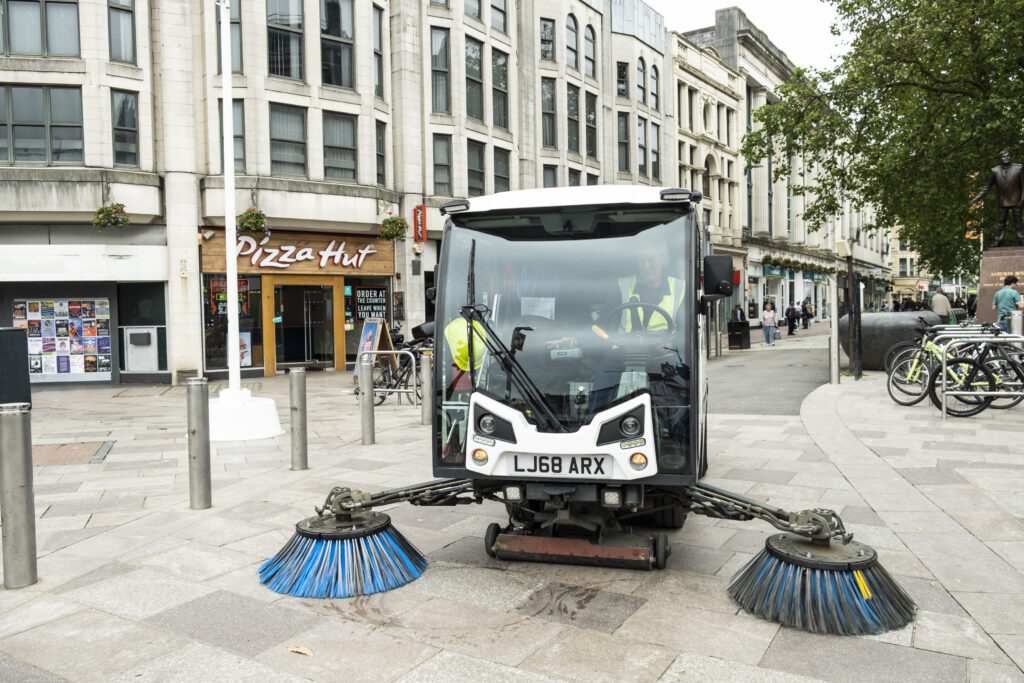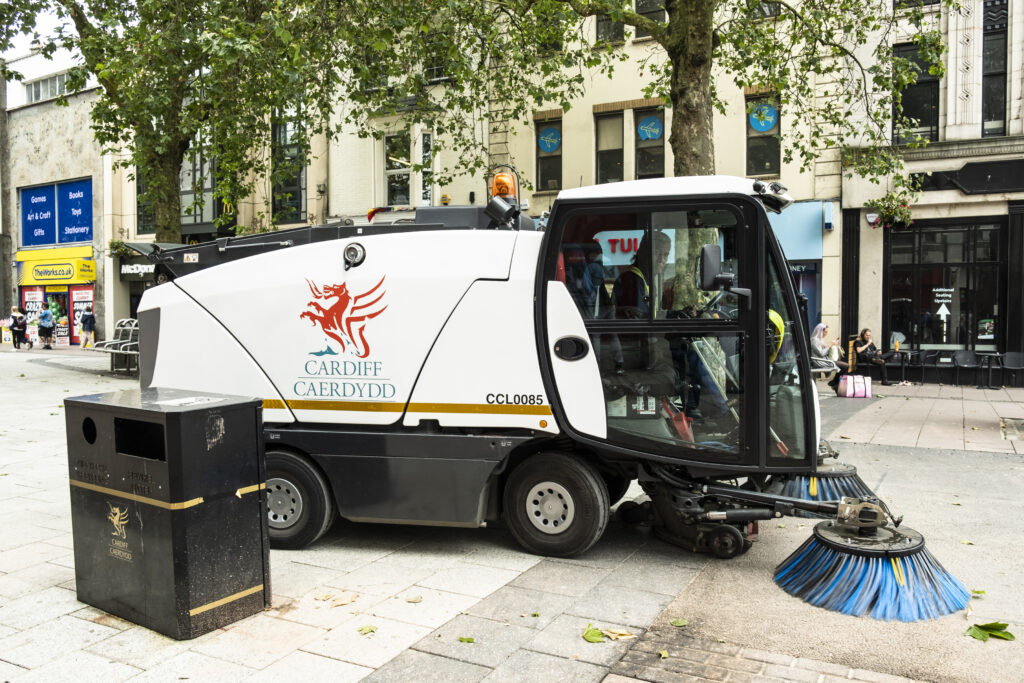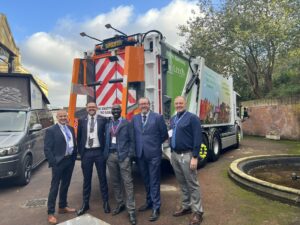When Cardiff awarded a tender for a new sweeper fleet on contract hire, the council discovered how close collaboration between suppliers and the implementation of intelligent telematics could deliver vital economies and help the City become a model of best practice, writes Ann-Marie Knegt.

Cardiff Council’s initial sweeper fleet consisted of 12 Johnston Sweepers CX201 compacts. The machines worked seven days a week in four shifts: morning, afternoon, night, and at the weekend. Apart from the standard cleansing rounds, the local authority also has internal service level agreements, such as car parks, and for events, and the fleet also works on external contracts and ad hoc assignments during specific occasions and in shopping centres.
Matt Long, Service Manager for Waste Services for Cardiff Council, is in charge of improving the business efficiency of the street cleansing department. So, when the fleet contract came up for renewal in 2018, he had several challenges to address.
‘As Cardiff is a capital city with lots of events and a popular nightlife and student scene, the workload for street cleansing is hefty,’ says Matt. ‘The fleet rotation was a specific challenge for the management team. Some of our sweepers were triple shifted, and despite all sweepers being the same brand and model, the operators all had their favourites and didn’t like to drive another sweeper.’
Excess hour charges and early warranty termination
That was not Cardiff’s only hurdle. With a weekly usage period agreed in the contract, certain vehicles were exceeding their hours while others were in use for less than their allocated time. It was not sustainable, resulting in excess hour charges and early warranty termination.
Monitoring fleet performance also posed a problem for the council. For instance, it was impossible to check if a round had actually been swept and not just driven. Idling was an issue, as well as complaint management. In addition, Cardiff Council’s external clients required the council to produce more detailed reports, such as time spent on site and cleansing frequencies.
The team also needed to provide evidence in case of accidents and false claims. Matt says the standard vehicle tracker on the sweepers did not offer the depth of information required for thorough accident investigation, nor the general performance of the fleet.
Cardiff Council already had a well-established relationship with its suppliers through the Optimised Waste and Logistics Partnership (OWL), which is managed by telematics provider CMS SupaTrak, based in Swindon. The OWL Partnership promotes an integrated approach for vehicle procurement. All parts of the vehicle supply chain, including the OEM, the contract, hire and lease provider as well the telematics, camera, and software company, should work together to ensure that the highest standards are maintained. OWL also aims to improve environmental standards for the public sector and eliminate road transport air pollution.
This approach paid off after Cardiff went through a competitive tendering process. The council awarded Dawson Group Municipal the contract for 12 new Johnston CX201 compact sweepers on a three-year contract hire agreement with maintenance in September 2018.
Historically, Johnston Sweepers products have been successful for Cardiff, and the local authority has worked well with Dawson Group Municipal in the past. Matt says: ‘Both maintenance support and account management have been very responsive and to a high standard. It was no surprise that Dawsons was able to satisfy the stringent quality evaluation criteria Cardiff applies when procuring vehicles.’
He adds that driver feedback has always been positive for the manoeuvrability of the Johnsyon CX201 sweepers, particularly around the city centre and parklands where drivers need to negotiate street furniture. Cardiff has a high incidence of both urban and suburban tree cover. Leaf fall season demands a robust, powerful sweeper and the CX201 meets this requirement.
However, the council had never previously had much success with detailed telematics on sweepers. The new contract changed this.
Smart tracking and data analysis
All compact, mid-sized and truck-mounted Johnston sweepers come with the Smart Link vehicle tracking and management system supplied by CMS SupaTrak. Smart Link provides the company’s products with the connectivity to carry out servicing even faster, while also providing the client with a range of operational and performance data. There are several subscription-based packages available.
Improved KPIs
Each of Cardiff’s compact sweepers submits tracking, performance, service, and diagnostic smart data. The information can be viewed through an account-based portal on a dashboard, enabling the fleet manager to track the location of sweepers via Google Maps, as well as reviewing KPIs such as fuel consumption, engine rpm, and hours worked.
The Smart Link software picks up drivers’ habits, alerting the fleet managers to critical warnings such as speeding and sweeping without water. The monitoring system encourages the correct operation of the fleet, while performance is continuously measured.
Cardiff can now see when sweepers require service, and have the ability to store information and produce reports as evidence of work completed. Smart Link also protects against third party insurance claims.
Initially, Cardiff supplied the machine hours to Dawsons to collate and feed back via contract meetings. With the new contract and introduction of Johnston Smart Link, all parties have access via the telematics system. The system schedules the reports and shares them monthly with Cardiff and suppliers.
Matt explains that the Smart Link system naturally guides the council to liaise with all the OWL partners, and the product did not require retrofitting because it is OEM-approved, which eliminates warranty issues.
‘As the fleet lifecycle progresses, we observe more significant benefits with the Smart Link system acting as a go-to platform for these technologies,’ said Matt. One of these is ring-fencing, which offers more robust management of vehicle movements without the need to apply additional staff expenditure.
‘For our sweepers, this includes monitoring vehicle movements for contract management, including private contracts with car parks, shopping centres, and internal service level agreements for our events teams.Our customers are surprised by how easily this data can be provided and resolve disputes.’

Cardiff found very rapidly that Smart Link delivered significant benefits for fleet operation. ‘The usability of Smart Link is outstanding,’ says Matt, ‘For service delivery managers like myself, it is fantastic to have a fully configurable dashboard that enables you to customise the information in the format required. It provides instant feedback, which previously would have taken hours of interrogating telematics reports.’
Cardiff has been able to achieve high transparency for its operations as it now has a much better understanding of vehicle and driver performance. Matt explains that in these times of financial austerity, this provides reassurance that the service is operating efficiently and maximising vehicle utilisation.’
Productivity increase
Cardiff Council now has real-time access to live and historical fleet movements, including a comprehensive sweeping data and reports. ‘We especially love the Google Map and Street View, which has proved an excellent tool for investigating brush arm damage. We are also managing our hours so much better, and have now implemented a system of information-led vehicle rotation. Smart Link has enabled us to design our round more efficiently. Hence, our shift productivity has gone up considerably.’
And, because the fleet team now has a constant overview of where its drivers are through the live location provision, operator safety has much increased. All in all, Cardiff’s fleet team manages its internal and external contracts much more efficiently.
‘We have finally brought down vehicle downtime to a minimum so we can now focus on taking our operation to the next level. We are looking to introduce further guidance and support for drivers. Individual driver IDs can offer an insight into performance, helping us focus on reducing fuel use and emissions, and we are looking to introduce route compliance programmes to remove unnecessary mileage while managing alert data in real time. We also want to make the data available to everyone by putting this on big screens in our communal areas,’ concludes Matt.




